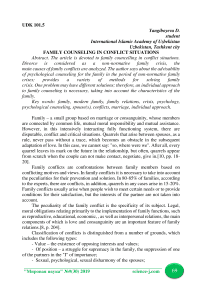Family counseling in conflict situations
Автор: Yangiboyeva D.
Журнал: Мировая наука @science-j
Рубрика: Основной раздел
Статья в выпуске: 9 (30), 2019 года.
Бесплатный доступ
The article is devoted to family councelling in conflict situations. Divorce is considered as a non-normative family crisis, the main causes of family conflicts are analyzed. The author says about the advisability of psychological counseling for the family in the period of non-normative family crises; provides a variety of methods for solving family crisis. One problem may have different solutions; therefore, an individual approach to family counseling is necessary, taking into account the characteristics of the family.
Family, modern family, family relations, crisis, psychology, psychological counseling, spouse(s), conflicts, marriage, individual approach
Короткий адрес: https://sciup.org/140264920
IDR: 140264920 | УДК: 101.5
Текст научной статьи Family counseling in conflict situations
Family – a small group based on marriage or consanguinity, whose members are connected by common life, mutual moral responsibility and mutual assistance. However, in this intensively interacting fully functioning system, there are disputable, conflict and critical situations. Quarrels that arise between spouses, as a rule, never pass without a trace, which becomes an obstacle in the subsequent adaptation of love. In this case, we cannot say: "so, where were we". After all, every quarrel leaves its mark on the future in the relationship, but often, quarrels appear from scratch when the couple can not make contact, negotiate, give in.[10, pp. 1820].
Family conflicts are confrontations between family members based on conflicting motives and views. In family conflicts it is necessary to take into account the peculiarities for their prevention and solution. In 80-85% of families, according to the experts, there are conflicts, in addition, quarrels in any cases arise in 15-20%. Family conflicts usually arise when people wish to meet certain needs or to provide conditions for their satisfaction, but the interests of the partner are not taken into account.
The peculiarity of the family conflict is the specificity of its subject. Legal, moral obligations relating primarily to the implementation of family functions, such as reproductive, educational, economic, , as well as interpersonal relations, the main components of which is love and consanguinity are an important feature of family relations.[8, p. 204].
Classification of conflicts is distinguished from a number of grounds, which includes the following types:
-
- Value – the existence of opposing interests and values;
-
- Of position – a struggle for supremacy in the family, the suppression of one of the partners in the "I" of importance;
-
- Sexual, psychological, sexual disharmony of the spouses;
-
- Emotional – lack of positive emotional needs (lack of affection, attention, care from the partner);
-
- Non – hazardous the sudden appearance of signs of fatigue arising conflicts quickly;
-
- Threat – the fundamental belief of one spouse to convince the personal opinion of the partner, for example, the rejection of the habits, methods of education;
-
- Especially dangerous – leading to divorce;
-
- Open (explicit) – abuse of spouses to each other in verbal and physical form;
-
- Hidden – spouses are not recognized for some time. Their behavior is not implemented.
The openness and secrecy of the conflict are determined at the individual psychological level of the characteristics of each family member, as well as the level of education and the causal essence of the conflict. The immediate cause and intensity of emotional outbursts determine the relevance of the conflict. The progressive conflict leads to an increase in tension, due to the lack of adaptation to each other. The causes of conflicts in the family are as follows:
-
- localization of the tone of freedom of action, personal expression of each family member;
-
- antisocial behavior of one family member or several (drug addiction, alcoholism);
-
- discrepancy of interests their opposition, oppression of personal opportunities of one of family members( in his opinion);
-
- authoritarian, domineering type of relations in the family as a whole;
-
- material insurmountable problems;
-
- related interference in family relationships;
-
- sexual incompatibility.
The stages of conflict reflect those moments characterized by the development of conflict, from its emergence to its conclusion.
-
1. pre-conflict stage: a conflict situation or a potential conflict in which there is an increase in social danger or the development of the conflict is a clear awareness of the incompatibility of preferences and positions, the consolidation of the conflicting parts, the presentation of claims to the opponent;
-
2. incident;
-
3. escalation of conflict: conflict events conflict or prosperity, its formation;
-
4. balanced confrontation;
-
5. ending the conflict: the unraveling of the conflict or conflict restructuring;
-
6. the stage is post-conflict.
-
B. L. Eremin selects the next phase of the conflict:
-
- confrontational (military) phase: the desire of the two parts to ensure their own interest by eliminating the enemy;
-
- compromise (political) phase: the desire of the parts on the occasion of achieving personal interest in the negotiations, producing a change of different interests of each person on a common mutual concessions;

-
- communicative (management) phase: the desire of the parts to reach an agreement that independence has not one person of the conflict, but also his interest.[2, p. 125].
Analyzing the causes of family conflict, the factors of micro-and macroclimate are considered. The fall of material wealth, the abuse of one of the family members, difficulties in employment of spouses or relatives, housing issues, lack of access to children in child care are factors in the microenvironment.
Forms of flow are features of family conflicts, as well as their dynamics, which is characterized by the classic stages such as the emergence of a conflict situation, it is the realization, the confrontation between the open form and its development, resolving conflict and emotional experience. However, conflicts of this type are characterized by above-average emotional reactions, rapid stages, confrontation like reproaches, quarrels, insults and family scandals. Analyzing marital conflicts, as well as family, it is necessary to consider critical periods in family development. In the first year of matrimonial life there is the first critical period in which spouses adapt to each other. It is noted that during this period the number of divorces from the total number of marriages is up to 30 %.[7, p. 215-218]. The emergence of children is directly linked to the emergence of the second critical period, with which new commitments emerge. The birth of a child can be a test in the relationship of young parents, who are now responsible for the upbringing and caring for the child. Professional development and realization of interests are limited, while the views of spouses and their parents on the upbringing of the child may not coincide. The care of the wife for the child causes her fatigue and leads to a short pause in sexual relations.
-
1 0-15 years of marriage are called the average age of marriage, which coincides with the third crisis period and is marked by a lack of feelings.After 1824 years of marriage spouses comes the fourth period of the crisis, the main reason for which are the experiences of his wife about the possible betrayal of her husband.
The image of the future husband or wife is formed before marriage, which consists of parental experience, stories of friends and acquaintances, books and movies. It happens that the role expectations are too high and in the life of the spouses are not as such confirmed, leading to disappointment and the emergence of role-playing conflicts. The problem of dominance also refers to role conflicts that arise in determining the dominant role among spouses.
The lack of experience or willingness of spouses to perform their marital roles and functions also leads to conflicts. Not every spouse can sacrifice their benefits and time to build a happy family life and maintain it, and in the future and overcome the domestic test. Excessive selfishness of one of the spouses may also lead to conflict situations.[4, pp. 98-99].
The frequency, solidity and strength of conflict are determined by crisis, conflict, problem and neurotic families.
-
- Crisis the family is characterized by the opposition of spousal interests and needs, bearing sharp specificity and covering the important area of family life.
Spouses are hostile to each other, not agreeing to concessions. All those marriages that break up or are in the moment of disintegration.
-
- Conflict family is merely oppositional in nature, when between spouses there are areas, where their interests clash, behind which lurk the negative emotions that destroy and quite strong. But, despite them, the preservation of marriage is possible thanks to the pliability and spouses and finding compromises in resolving conflicts.
-Troubled families have long difficulties, deprives the marriage stability. Relations between spouses can be aggravated due to the disease of one of them, lack of housing, financial difficulties, which can even lead to mental disorders of one or both spouses.
Neurotic family is characterized by the impact of accumulated psychological difficulties encountered in life. Increased anxiety, poor sleep, short temper, excessive aggressiveness in spouses are the main indicators of the neurotic family.
In case of conflict situations in the family, counseling can be carried out both individually with one of the spouses, and work with a married couple. Let us consider in more detail the forms of such counseling.
When working individually with one of the family members, the relationship between the consultant and the client is carried out in the classical style, when the family relationship is described in an invisible context, namely by the memory and description of the client.
When there are marital or family conflicts, in most cases one of the spouses applies. The main "reasons" for referring to a psychologist are sexual problems in the family, family responsibilities and role distribution, difficulties in communication. The client can consult a psychologist without notifying his partner.
Список литературы Family counseling in conflict situations
- Posysoev, N. N. (ed.) (2004). Osnovy psihologii sem'i i semejnogo konsul'tirovaniya: ucheb. posobie,Moscow, p. 10 (in Russian).
- Olifirovich, N. I., Zinkevich-Kuzemkina, T. A. & Velenta, T. F. (2006). Psihologiya semejnyh krizisov,Rech', St. Petersburg, 360 p. (in Russian).
- Grebennikov, I. V. (1991). Osnovy semejnoj zhizni, Prosveshchenie, Moscow, p. 256.
- Gozman, L. Ya. (1987). Psihologiya ehmocional'nyh otnoshenij, Izd-vo Mosk. un-ta,Moscow,120
- Ehjdemiller, Eh. G. & Yustickis, V. (1999). Psihologiya i psihoterapiya sem'i,Piter,St.Petersburg,656
- Prohorova, O. G. (2005). Osnovy psihologii sem'i i semejnogo konsul'tirovaniya: ucheb. posobie, TCSfera, Moscow, p. 134 (in Russian).
- Korneeva E. Psychology of family crisis: psychological counseling during non-normative crises


